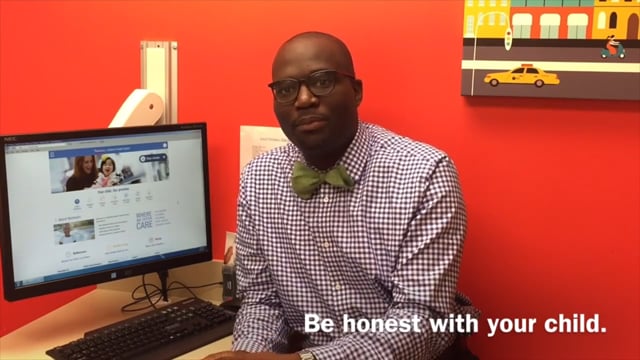Talking to Kids About Gun Violence
When there’s gun violence in your community, or in the world at large, it’s normal for kids to worry that it might happen to them or someone they love. You may wonder how to talk with your child about it and what’s OK to say. Here are some tips that can help.
When Should I Talk With My Kids About Gun Violence?
When gun violence happens, kids might need time before they’re ready to talk about it. Some kids may want to talk but not know how to start the conversation. If they stay close by, like when you’re doing chores, it could be a sign they’d like to chat. Other kids may not be as comfortable talking and instead express themselves through writing, music, or art.
But if your child doesn’t seem interested in the event or doesn’t want to talk about it right away, don’t push. If you think your child is curious, you can ask if there's something they want to talk about.
What Should I Say About Gun Violence?
Let your child’s questions be your guide as to how much information to share. Other things to keep in mind:
Be honest. Tell the truth about what happened, but don’t offer more details than your child is interested in. Stick to the basic facts and say something like, “There was a shooting and some people got hurt, but it’s over now.” Your goal is to calm any fears and help kids feel safe.
Support your child’s emotions. Don’t dismiss what kids are feeling. If they tell you they’re upset or scared, avoid saying things like, “Don’t worry about it. You’ll be fine.” Instead, echo what they said: “Yes, I see this makes you very scared.” This lets kids know you’re hearing and understanding them.
Explain things based on kids’ age and maturity. Consider how much kids can grasp and absorb. If you feel like your child wants to talk, start by asking something like, “What have you heard about what happened?” or “What have your friends said?”
Here are some age-based tips:
- Early grade school: Keep the information short and simple. Remind kids that they have adults to protect them. If the gun violence happened at a school, explain what helps keep them safe, like doors to the outside being locked and practicing emergency drills. For very young kids, use things like picture books or drawings to help them “say” what they’re feeling.
- Older kids: Talk about the bigger picture. You can discuss how it’s wrong to hurt or kill someone and use guns improperly. Kids this age tend to ask questions like, “Am I really safe?” or “How am I protected?” Tell them what the community and their school are doing.
- Teens: Teens may have strong feelings about gun violence, so you can ask something like, “What do think about what happened?” You can also talk about why people hurt others. Perhaps they have a mental health condition or trouble with anger, use drugs, or drink alcohol. Let teens know that people in the community are there to help in these cases (doctors, teachers, police, religious leaders, etc.). Remind them that if they feel angry, they should go to you or another trusted adult. This is also a good chance to mention the dangers of drugs and alcohol. You also can direct teens to this article.
If your child asks a question that stumps you, say you’ll find out. Or use age-appropriate websites to look for an answer together.
No matter your child’s age, listen and be patient. Let kids ask questions, talk about their fears, and say what’s on their mind. Letting them get their feelings out in the open can help them — and you — feel better.
How Else Should I Know?
Keep an eye on what kids watch. Limit what your kids see about gun violence on TV, online, and on social media. Kids are curious, but it could make them upset or anxious. Also pay attention to how often you discuss the news in front of them. Don’t let the TV news play in the background all day.
Help kids feel in control. After an episode of gun violence, finding ways to help can give kids a sense of control. Consider donating items, volunteering, or writing letters. Look for news stories that highlight what other people are doing.
Explain to kids that paying attention can help prevent gun violence. If they hear or read that someone is planning to hurt someone, they should tell a trusted adult right away. They should also speak up if someone seems angry or depressed.
You also can talk with kids about gun safety.
Stick to a routine. This can help kids feel secure. Make sure they’re physically active, get enough sleep, and eat well. See that they do all their homework and go to any usual after-school sports or clubs. But if things seem to be too much for them, don’t force it.
Watch for stress. If your child shows changes in behavior (like not sleeping or eating, not wanting to be around people, or worrying all the time), call your doctor or a behavioral health care provider. They can help your child manage anxiety and cope.
With good communication, love, and support, you can help make your kids feel more safe and secure.

Pediatric Psychologist: Talking to Kids About Tragic Events
After something as tragic as the school shooting in Uvalde, Texas, you may be wondering what to tell your kids or how to talk to them about such horrible events, especially if they are asking questions. Nemours pediatric psychologist Dr. Roger Harrison offers some great tips on how to have this conversation. For more tips on how to discuss the news with your child, visit /NAPNAP/en/parents/news.html

© 1995- The Nemours Foundation. KidsHealth® is a registered trademark of The Nemours Foundation. All rights reserved.
Images sourced by The Nemours Foundation and Getty Images.

